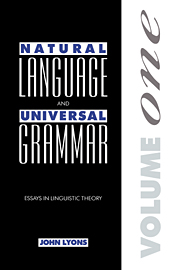Book contents
- Frontmatter
- Contents
- Preface
- Typographical conventions
- 1 Language, speech and writing
- 2 In defence of (so-called) autonomous linguistics
- 3 Linguistic theory and theoretical linguistics
- 4 Natural, non-natural and unnatural languages: English, Urdu and other abstractions
- 5 The origin of language, speech and languages
- 6 Phonemic and non-phonemic phonology: some typological reflections
- 7 Towards a ‘notional’ theory of the ‘parts of speech’
- 8 Deixis as the source of reference
- 9 Deixis and anaphora
- Appendix: The scientific study of language. Inaugural Lecture, Edinburgh, 1965
- Notes
- References
- Subject index
- Names index
3 - Linguistic theory and theoretical linguistics
Published online by Cambridge University Press: 05 June 2012
- Frontmatter
- Contents
- Preface
- Typographical conventions
- 1 Language, speech and writing
- 2 In defence of (so-called) autonomous linguistics
- 3 Linguistic theory and theoretical linguistics
- 4 Natural, non-natural and unnatural languages: English, Urdu and other abstractions
- 5 The origin of language, speech and languages
- 6 Phonemic and non-phonemic phonology: some typological reflections
- 7 Towards a ‘notional’ theory of the ‘parts of speech’
- 8 Deixis as the source of reference
- 9 Deixis and anaphora
- Appendix: The scientific study of language. Inaugural Lecture, Edinburgh, 1965
- Notes
- References
- Subject index
- Names index
Summary
One of my aims in this chapter, which complements the preceding one, is to motivate a distinction between two terms that are currently employed by most linguists as synonyms and to use this terminological distinction as a peg upon which to hang some comments about the present state of linguistics. The terms in question are ‘linguistic theory’ and ‘theoretical linguistics’. Another aim is to comment further upon the theoretical term ‘language-system’ in relation to Saussure's terms ‘langue’ and ‘langage’.
The distinction between ‘linguistic theory’ and ‘theoretical linguistics’ is by no means the only terminological distinction that I shall be drawing, here and in other chapters of this book. I do not wish to give the impression, however, that my sole (or primary) concern is at any point purely terminological. I am much more interested in the metatheoretical or methodological issues that the use of one term rather than another, or of one term in addition to another, helps us to identify. As far as the terms ‘theoretical linguistics’ and ‘linguistic theory’ are concerned, I wish to suggest that, if they are kept distinct, each of them can be usefully employed to refer to what have now emerged, or are in process of emerging, as two rather different, but equally important, sub-branches of linguistics.
When my Introduction to Theoretical Linguistics (1968a) was published, more than twenty years ago, it was hailed by Bar-Hillel as “the first [book of its kind] … to carry the long overdue adjective ‘theoretical’ in its title” (1969: 449).
- Type
- Chapter
- Information
- Natural Language and Universal GrammarEssays in Linguistic Theory, pp. 27 - 45Publisher: Cambridge University PressPrint publication year: 1991



